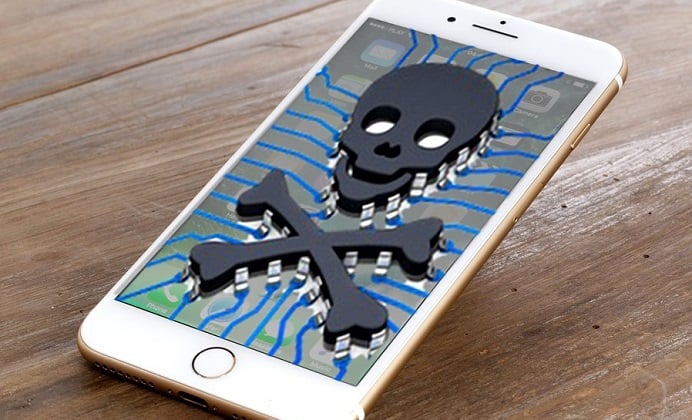It is rare for an iPhone to get viruses, but the fact is that it can get infected with malware. For an iPad or iPhone, you don’t need to install an antivirus app. Some people also try to use a virus cleaner to remove viruses. All you need is to avoid the iPhone from getting viruses.
An iPhone can be used to store much data, and especially messages, photos, contacts, and any other sensitive information from email linked with the device. It can be a terrible disadvantage when a hacker can get the data for his or her gain. The best thing with the iPhone is that it has listening, tracking, and viewing capabilities. With that, when hacked, it will allow the hacker to get access to your conversations, view the camera, and also use GPS location.
As it is possible for an iPhone to get viruses, how can you remove them? Do you also have a way to prevent a breach?
Overview About iPhone Viruses and Malware
A virus can be termed as an unwanted invader to your handheld device. Technically, you should know there is a difference occurring between malware and viruses. For malware, it means malicious software such as worms, viruses, and Trojan horses. Anything that can be used to harm or get information from your iPhone is categorized under malware. Virus, on the other hand, it’s a specific malware.
When an iPhone is infected with malicious software, they replicate themselves by modifying their own code after invading.

Why iPhones Won’t Get Viruses
In iPhones, viruses are the programs that have been designed so that they can do malicious things such as stealing your data. They can be spread to other iPhones. For the virus to achieve its purpose, it has to be installed on your iPhone, run, and communicate with your programs to enhance data in control.
The best thing, the architecture of iPhone OS (iOS) doesn’t allow such apps. The design of the iPhone is to ensure that every app will have to run on its own. iOS apps can communicate with each other, but there are limitations. So, by restricting the apps to interact with iOS or each other, it has helped the risks of getting viruses.
Additionally, there is a further reduction in the way users get the apps. With iPhone, you only install approved apps from your App Store, and therefore, no viruses are present. Besides, Apple also has to evaluate every app before it can be available in its App Store. That ensures that there is no virus in their App Store. So, with many layers of security, you can consider it as a safe system.
Risks of iPhone Getting Viruses
The actual risks of your iPhone are the worms that affect the jailbroken devices. As long as you don’t jailbreak the iPhone, you should know you’re secure from viruses attacking your iPad or iPhone.
In case you want to figure out the risks of getting iPhone viruses, check for antivirus software from the App Store. It turns out that you won’t get any!
There are many antivirus companies such as Trend Micro, Mcafee, Symantec, and more. They have security apps available for iPhone devices. The only problem is that none of them come with antivirus tools. They are there to help you when you want to find lost devices, secure web browsing, back up your data, and protect your privacy.
You can’t get any antivirus programs available from the App Store. In case iPhones were capable of getting viruses easily, then there could be many antiviruses. All you have to do is avoid things that can lead to viruses.

Tips of Preventing Viruses On iPhone Devices
If you need to prevent getting viruses in your iPhones, there are some precautions you have to consider. Here are the tips for preventing viruses.
-
Prevent Jailbreaking
There are some temptations you will get to jailbreak your iPhone. That will allow you to upload software and apps from outside the App App Store. It is an understandable urge, but after jailbreaking, it helps you void warranty. It also enables you to leave your device into viruses that was formerly protected.
-
Updating the Device
It is tempting for you to wait before updating the system. Don’t be comfortable with your last version. It is, therefore, essential to ensure you update the device soonest.
With operating system updates, it is among the ways that Apple uses to introduce new features and also fix bugs. Besides, it also helps to keep the device secure at its highest possible level. If there is a security breach, the iPhone programmers will work to tighten up such chinks in the iPhone’s armor.
-
Install Apps from the Apple App Store
The other way to keep your iPhone device from getting viruses or other malware is purchasing and downloading the Apple App Store programs. That gives you a limitation if you haven’t jailbroken your device. With Apple’s App Store, it has been known to offer secure approved apps from the vetted developers.
-
Avoid Suspicious Robocalls, Phishing & Links
Other ways can lead to viruses attacking your iPhone. For example, you might have a friend sending you a questionable download in your email. It is a robocall that will urge prompt action telling you to update your account info.
Some might be legitimate, and others might be scammers. The scammers will be aiming to access your personal data from your iPhone. It is, therefore, necessary to avoid clicking such suspicious links. That will help you prevent your iPhone from getting viruses.
The Final Verdict
An iPhone can get viruses. If you suspect that it is acting strange, it might have picked some viruses. Sometimes, it might not be the case. You need to ensure your iPhone is updated sooner, avoid jailbreaking the iPhone and avoid suspicious apps, downloads, or links. It will prevent viruses from affecting the iPhone. You can check on the symptoms to know whether you have virus problems. Taking great measures will keep your information and data safe on your iPhone.




